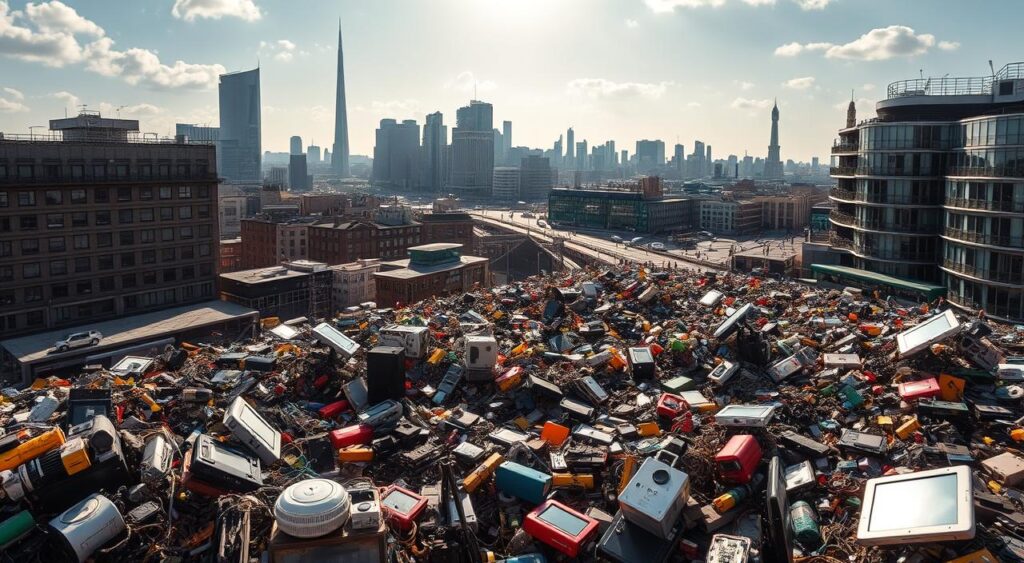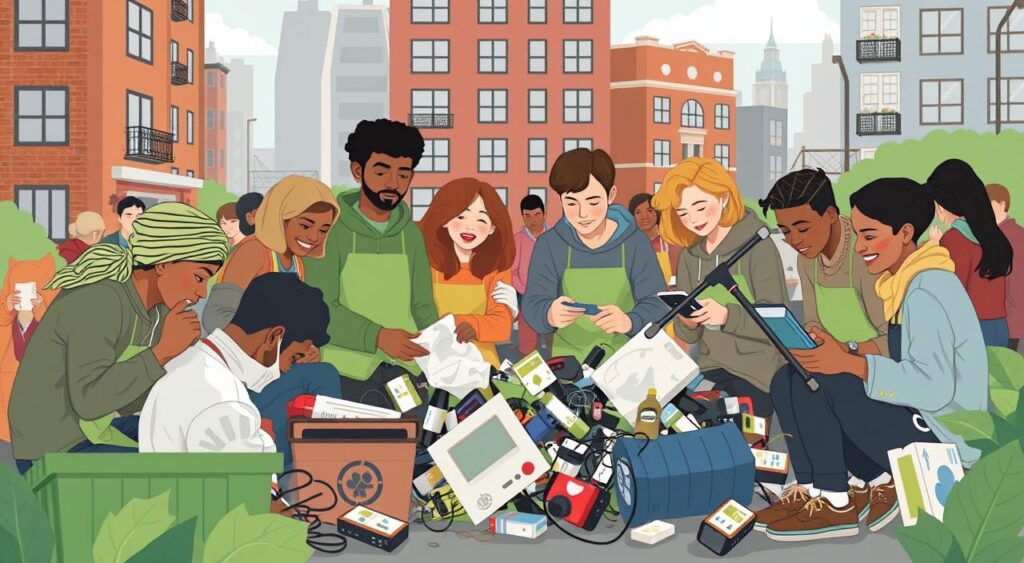Circular Economy London is revolutionizing the way the city manages electronic waste (e-waste), turning discarded electronics into valuable resources like Olympic medals. By embracing sustainable practices, London is reducing environmental harm and creating economic opportunities. This article delves into the city’s innovative recycling initiatives, community-driven upcycling, corporate responsibility, and how residents can contribute to a zero-waste future.

Key Takeaways
- Circular Economy London pioneers innovative e-waste management solutions.
- Discarded electronics are transformed into valuable resources, like Olympic medals.
- Proper e-waste management yields environmental and economic benefits.
- London’s recycling efforts set a global standard for sustainability.
- Residents and businesses have access to diverse upcycling and recycling services.
The Growing Challenge of Electronic Waste in London
London faces a rising tide of electronic waste due to rapid technological advancements and population growth. Improper disposal of these materials poses significant environmental and health risks, making effective management a priority for Circular Economy London.
Environmental and Health Impacts
Electronic waste contains hazardous substances like lead, mercury, and cadmium, which can contaminate soil and water if not handled correctly. Mishandled batteries can also cause fires in waste facilities. Vulnerable groups, including children and pregnant women, face health risks such as respiratory issues from e-waste toxins.
To mitigate these risks, London is prioritizing safe disposal and recycling practices. Learn about responsible e-waste disposal.
Understanding Circular Economy London

Circular Economy London is at the forefront of the city’s strategy to reduce e-waste and promote sustainability. This model focuses on eliminating waste, reusing materials, and regenerating natural systems, contrasting with the unsustainable “take-make-dispose” linear economy.
A Shift Toward Sustainability
By viewing discarded electronics as resources, Circular Economy London is driving innovation in recycling and business practices. The city aims to become a zero-waste hub, supported by events like Fixfest2025 (September 5-6, 2025), which brings together repair advocates and sustainability experts.
Key initiatives include:
- Increasing recycling rates for electronics.
- Promoting community-driven repair and upcycling.
- Encouraging businesses to adopt sustainable waste management.
These efforts ensure London stays ahead of technological changes while pursuing sustainability. Explore circular economy principles.
Upcycling Electronic Waste: Services and Solutions
London’s e-waste management includes professional services and community initiatives that align with Circular Economy London’s goals.
Professional Collection Services
Specialized e-waste collection services ensure safe and compliant disposal for individuals and businesses. These services divert electronics from landfills, supporting the city’s zero-waste vision.
Community-Based Upcycling
Initiatives like the Agbogbloshie Makerspace Platform transform e-waste into art, educational tools, and functional items. These programs foster creativity and promote sustainable practices among residents. Find local upcycling workshops.
London’s Olympic Legacy: Medals from Recycled Electronics
The 2012 London Olympics showcased Circular Economy London by crafting medals from recycled electronics, setting a global standard for sustainable event management.
Sustainability in 2012
Using recycled materials for medals reduced waste and highlighted the value of e-waste. This initiative influenced subsequent Olympic Games, as shown below:
| Year | Olympic Initiative | Sustainability Impact |
|---|---|---|
| 2012 | Medals from recycled electronics | Reduced e-waste, promoted recycling |
| 2016 | Recycled materials in infrastructure | Minimized environmental footprint |
| 2020 | Circular economy principles | Enhanced event sustainability |
A Model for Future Events
London’s circular economy model continues to inspire global events, with plans for even more ambitious sustainability goals in future Olympics. Technological advancements are enhancing e-waste management, reinforcing London’s leadership in this space.
Business Solutions for Managing Electronic Waste
London businesses are integral to Circular Economy London, balancing corporate responsibility with regulatory compliance.
Corporate Responsibility
Businesses must manage e-waste responsibly to comply with regulations like the UK’s Waste Electrical and Electronic Equipment (WEEE) Directive, minimizing environmental impact.
Data Security in Disposal
Secure data destruction is critical for business electronics. Methods like physical destruction and NIST-compliant data wiping ensure compliance with GDPR. Key considerations include:
- Documenting data destruction processes.
- Using certified services to prevent breaches.
- Partnering with professional e-waste services.
Hackerspaces: Creative Hubs for E-Waste Transformation
London’s hackerspaces are vibrant centers for repurposing discarded electronics, aligning with Circular Economy London’s mission.
Community-Driven Innovation
Hackerspaces foster collaboration, enabling residents to share skills and ideas for e-waste recycling and upcycling. These spaces drive innovation in sustainable practices.
Skills Development
Participation in hackerspace projects builds technical skills in electronics, programming, and design, enhancing employability in the green technology sector. Workshops range from basic repairs to advanced reverse engineering, complementing STEM education.
Recovering Valuable Materials from Electronic Waste
Electronic waste contains precious metals and rare earth elements (REEs) essential for manufacturing. Recovering these materials supports sustainability and reduces reliance on mining.
Precious Metals Recovery
Metals like gold, silver, and palladium are abundant in electronics and can be recovered through advanced recycling. This reduces environmental harm and supports new device production.
Rare Earth Elements
REEs like neodymium and cerium are critical for electronics. Urban mining from e-waste addresses supply chain challenges and meets growing demand. The table below highlights key REEs:
| Rare Earth Element | Application in Electronics | Value in E-Waste |
|---|---|---|
| Neodymium | Magnets in hard disk drives | High |
| Dysprosium | Specialized magnets | Moderate |
| Cerium | Catalysts and displays | High |
London’s recycling facilities are developing innovative processes to improve material recovery efficiency.
E-Waste Collection Points in London
London offers accessible e-waste disposal options to encourage responsible practices among residents.
Municipal Recycling Centres
Municipal centres accept a wide range of electronics, ensuring proper recycling and reducing landfill waste.
Retailer Take-Back Schemes
Retailers like Currys PC World and Apple offer take-back programs, allowing consumers to return old devices when purchasing new ones. These schemes promote extended producer responsibility.
Economic Benefits of E-Waste Upcycling
Upcycling e-waste generates significant economic advantages, aligning with Circular Economy London’s goals.
Job Creation
The upcycling industry creates jobs in collection, refurbishment, and sales, including roles like collectors, technicians, and marketers.
Cost Savings
Upcycling reduces capital expenditure on new devices, lowers disposal fees, and generates revenue through material recovery. Secure data destruction prevents costly breaches, benefiting businesses and councils.
Success Stories: From Trash to Treasure
London’s creative community is transforming e-waste into valuable products, showcasing upcycling’s potential.
Local Entrepreneurs
Entrepreneurs are crafting items like lamps from computer parts, reducing waste and creating business opportunities.
Award-Winning Designs
Designers are creating art and functional items from e-waste, including:
- E-Waste Lamps: Made from recycled computer components.
- Recycled Jewelry: Crafted from electronic parts.
- Upcycled Art: Artworks from discarded devices.
Discover upcycling success stories.
Legal Framework for E-Waste in the UK

The UK’s legal framework ensures responsible e-waste management, with businesses required to comply with key regulations.
WEEE Directive
The WEEE Directive mandates responsible disposal of electronics, promoting recycling and reuse to support Circular Economy London.
Compliance Requirements
Businesses must maintain waste transfer notes, certificates of destruction, and conduct audits to ensure compliance, particularly in sectors like healthcare and finance.
DIY Upcycling Projects for Londoners
Residents can contribute to Circular Economy London through DIY upcycling projects, transforming electronics into functional or decorative items.
Simple Upcycling Ideas
Old computer parts can become decor or tools, with inspiration available through online tutorials and workshops.
Resources and Workshops
London offers resources like community programs and tool libraries to support upcycling.
The Future of E-Waste Management in London
London’s e-waste management is evolving with technological and policy advancements driving progress.
Technological Innovations
New recycling technologies are improving e-waste processing efficiency, supporting higher recycling rates.
Policy Developments
London’s targets for e-waste collection and recycling, combined with extended producer responsibility, are shaping a robust framework. Post-Brexit policies may further enhance innovative approaches.
Conclusion: Embracing Circular Economy London
Circular Economy London offers a model for cities worldwide, transforming e-waste into valuable resources like Olympic medals. Through innovation, collaboration, and policy development, the city is building a sustainable future. Residents and businesses can contribute by adopting responsible disposal practices and supporting upcycling initiatives. With continued advancements, London’s vision of a zero-waste city is achievable, setting a global standard for sustainable urban living.